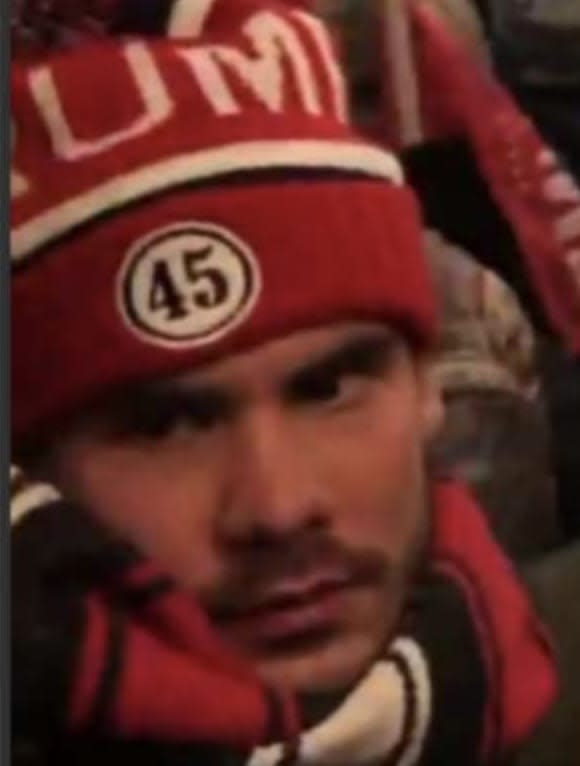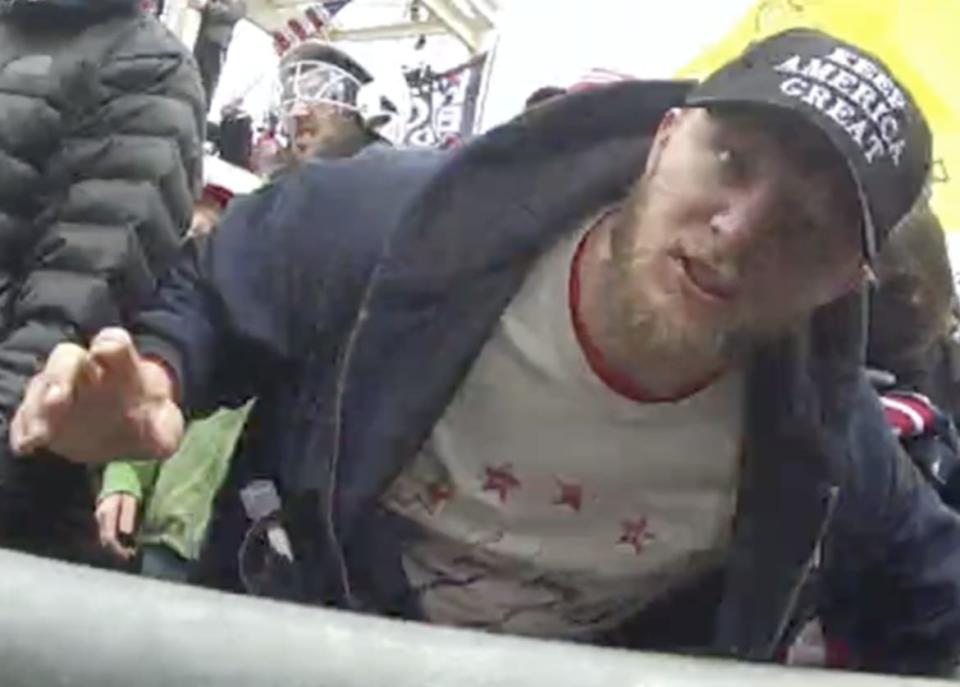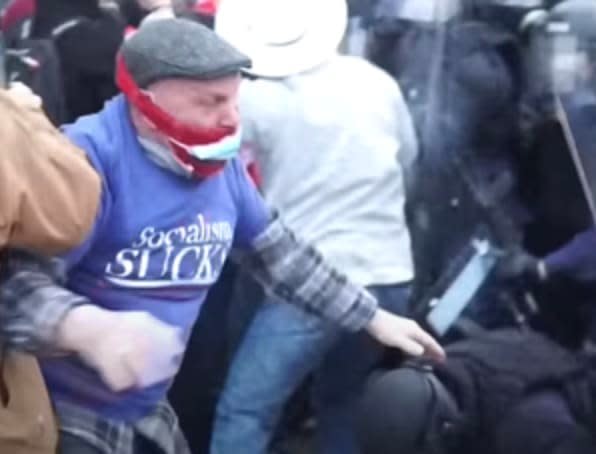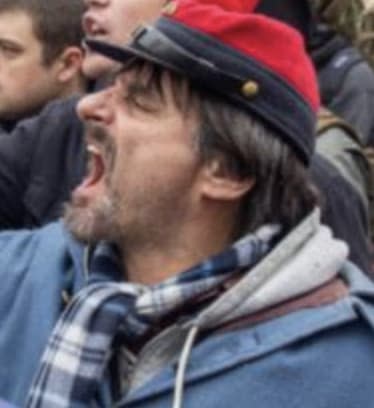Inside the Feds’ Hunt for Hundreds of Capitol Riot Fugitives

- Oops!Something went wrong.Please try again later.
A year after a pro-Trump mob bent on overturning the results of the 2020 presidential election sacked the U.S. Capitol, the hunt for suspects is nowhere near over.
In fact, the feds are still actively searching for hundreds of known rioters.
FBI Director Chris Wray has described the Jan. 6 attack as an act of domestic terrorism, which led directly or indirectly to five deaths, roughly 140 injured law enforcement officers, and $1.5 million worth of damage to the Capitol building. Among the alleged perpetrators bagged so far: violent extremists from 45 states and the District of Columbia; avowed neo-Nazis, active-duty and retired members of the military; off-duty cops; loosely affiliated groups of far-right gang members like the Proud Boys; QAnon adherents; and at least one Olympic gold medalist.
Immediately after the siege, the Department of Justice launched an investigation it called “one of the largest in American history.” Steven D’Antuono, assistant director in charge of the FBI’s Washington Field Office, said at the time the bureau would “leave no stone unturned until we locate and apprehend anyone who participated in the violence.” The scope of the task at hand was described by one defense attorney as being more complex than untangling the 9/11 attacks.
So far, more than 700 people have been charged for their alleged involvement in the riot, FBI spokesperson Samantha Shero told The Daily Beast. All face federal rather than state or local charges. They have ranged from trespassing to conspiracy against the United States.
Authorities are still looking for the person they say planted pipe bombs near the offices of the Democratic National Committee on the night of Jan. 5, and have not slowed in their efforts. Meanwhile, two-thirds of Republicans continue to believe Donald Trump’s so-called Big Lie that the election was somehow stolen from him, and nearly 40 percent of that group think violence is the only way to “save” the country, according to recent polling.
But if anyone there that day assumes they’re safe from prosecution because 12 months have passed, they’re wrong. Because not only are the feds hunting for them, a digital army of volunteer investigators are also on the case—and the ad hoc crew of citizen sleuths have already collected a dozen or so trophies.
Somewhat infamously, only 14 people were arrested by the U.S. Capitol Police on Jan. 6: 10 for unlawful entry; two for assaulting a police officer; and two for weapons possession. But the cascade of arrests, charges, and—in recent months—convictions and sentences has not stopped since then. Among other more recent highlights, in October, a Capitol Police officer was charged with obstruction of justice for telling one of the alleged rioters to delete incriminating evidence of his actions that day he had posted on social media.
And the search for violent thugs who preyed on the seat of American democracy goes on. According to FBI estimates, as of Dec. 30 there were “around 250 individuals” pictured on the agency’s Jan. 6 wanted list and accused of having assaulted law enforcement officers that day who have not yet been identified or arrested, according to Shero. An additional 100 suspects are wanted for committing other “violent acts” on Capitol grounds. The bureau says it is also looking to ID 16 suspects seen on video assaulting federal officers that day, and two suspects who were filmed assaulting members of the media.
The FBI declined to share details about any rioters agents have identified but have not yet arrested. However, the bureau has publicly pegged the total number of people involved in the Capitol attack that day at around 2,000.

FBI Person of Interest #509
In a modern twist, the feds have received an assist from civilians working to identify countless unnamed Capitol rioters caught on camera during the rampage. Decentralized online groups devoted to exposing rioters have some 2,500 names on their lists, which include people spotted outside the Capitol but who never entered the building. The work of these private “sedition hunters” has been cited in court documents at least a dozen times to date, and the bureau has received more than 250,000 tips from the public at large.
“While it may appear that no overt law enforcement action is being taken on some tips that have been submitted, tipsters should rest assured that the FBI is working diligently behind the scenes to follow all investigative leads to verify tips from the public and bring these criminals to justice,” Shero said.
Of the 2,000 or so people who were there, there are at least 1,000 who “crossed the threshold in terms of going into the Capitol and being hit [with] federal crimes,” according to Seamus Hughes, deputy director of the Program on Extremism at George Washington University, who called the number a “conservative estimate.”
“The law enforcement agencies that I’m talking to are still working through cases, and facial recognition, and still identifying folks as we speak,” Hughes, who is also a Daily Beast contributor, said in an interview.
Six days after the Capitol siege, D’Antuono of the FBI said in a statement that the bureau had to “separate the aspirational from the intentional, and determine which of the individuals saying despicable things on the internet are just practicing keyboard bravado or they actually have the intent to do harm.”
As of August, this worked out to about three arrests a day, according to the Department of Justice.
Hughes explained that the Department of Justice was “trying to clear the decks as best they can” of lower-level cases by offering plea deals that most defendants would agree to accept. This, suggested Hughes, allows investigators and prosecutors to focus their resources on bigger fish who were involved, like members of the Oath Keepers, a right-wing anti-government alliance that purports to consist of current or former police officers and military members and is classified as an extremist group by the Southern Poverty Law Center.
“They’re not slowing down by any means,” Hughes added. “They’re still working weekends. They still have agents pulled onto these cases that were pulled off of white-collar crime, ISIS cases, they’re all now on the January 6 investigation. They haven’t ramped down their resources on the investigation yet. And it’s not clear to me whether they will in the near future. This is to say that if individuals were there in the Capitol and think that enough time has passed, [that] they may have dodged a bullet, I would say the FBI is still looking for them.”

FBI Person of Interest #375
At ground level, the investigation is playing out exactly as it should be, retired FBI Supervisory Special Agent Dennis Franks told The Daily Beast.
The FBI’s Washington Field Office is heading up the investigation, with an assistant director overseeing it. There are new leads going out every day, to every division across the country, and agents are using “everything at their disposal” to crack each case, according to Franks, citing personal conversations with active and former agents.
“You get a lot of information that doesn’t pan out, but it still has to be pursued—you have to find if there’s something there or not,” said Franks. “They’re not going to set up a deadline that this has to be done by. They’ll just carry it out, follow it as long as it takes.”
Agents are tracking Jan. 6-ers down by weeding through a massive tranche of tips, utilizing facial recognition software, and subpoenaing records from internet and phone providers to obtain names of people who were in and around the Capitol building during the riot, according to court filings.
But in addition to providing tips and IDing suspected Capitol rioters the FBI may not have yet, citizen sleuths can trawl social media in ways that are generally off-limits for the feds.
“We’re not allowed to... just sit and monitor social media and look at one person’s posts… just in case,” FBI Director Christopher Wray told the House Judiciary Committee in June, citing the bureau’s civil liberties guidelines.
The work of citizen sleuths also provides a novel way for agents to keep their investigative techniques as close to the vest as possible, using “parallel reconstruction” in probable-cause affidavits when they can. Instead of explicitly including the geofencing or facial recognition tools they used, investigators can instead point to a tip from the public as the clue they needed for a positive ID.
One of the biggest questions pertaining to Jan. 6 has been the issue of coordination. A conspiracy, in legal terms, can be made up of just two people, said Franks, who worked as an assistant district attorney in North Carolina before becoming an FBI agent.
Many of the organized groups seen attacking the Capitol coalesced on the internet, with Facebook largely acting as “the big unifier,” according to Tech Transparency Project director Katie Paul, who specializes in tracking criminal activity online.
The algorithms social networks use to keep people engaged mean they’re not passive third-party platforms, but are actively facilitating this kind of organizing, Paul told The Daily Beast.
“I think as you have this older population growing increasingly digitally literate, with Facebook specifically, you run into a future where… the algorithm creates these alternative realities for people and makes it virtually impossible for them to break out of that loop of extremism,” said Paul. “In fact, the platform’s hand-feeding them more extremist content each time they click on something.”
Facebook has regularly disputed the charge that their algorithm fuels extremism, although whistleblower Frances Haugen told the U.S. Senate that the company knows its platform sows political division but has not done anything about it in choosing “profits over safety.”
Drew Pusateri, a spokesman for Facebook parent company Meta, told The Daily Beast that the “responsibility for the violence that occurred on January 6 lies with those who attacked our Capitol and those who encouraged them. We took steps to limit content that sought to delegitimize the election, including labeling candidates’ posts with the latest vote count after Mr. Trump prematurely declared victory, pausing new political advertising, and removing the original #StopTheSteal Group in November.”
After the violence at the Capitol on Jan. 6, Facebook “removed content with the phrase ‘stop the steal’ under our Coordinating Harm policy and suspended Trump from our platforms,” Pusateri said.

FBI Person of Interest #398
But one of the most striking revelations Paul said she has experienced while investigating the Capitol riot has been “how people that are affiliated with law enforcement can get looped into these kinds of worlds.”
Not only have Paul and her team spotted active and former military sharing extremist content online, they also identified a retired Capitol Police lieutenant who was “essentially cheering on the insurrection” on Facebook.
“There’s a really long way to go, especially when we know that now the military is considering even ‘liking’ or following certain extremist content as dismissible,” Paul said. (The Pentagon has identified “reading, following, and liking extremist material and content in social media forums and platforms” as potentially disqualifying, but it is still something of a “gray area,” according to an April 2021 memorandum from Secretary of Defense Lloyd J. Austin III.)
Another important area of focus in the aftermath of Jan. 6 has been to identify any elected officials who may have played an active role that day. The House Select Committee to Investigate the January 6th Attack on the United States Capitol, which was formed by Speaker Nancy Pelosi, a Democrat, is currently looking into any involvement or coordination in the run-up by elected officials. It has already subpoenaed a slew of politicians and members of Trumpworld, and will continue to do so in the coming weeks and months. The body does not itself have the authority to bring criminal charges against any of its targets, but can refer cases it recommends for prosecution to the Department of Justice, which will make the ultimate determination.
Public Wise, a Washington, D.C. watchdog group, is getting ready to launch its “Insurrection Index,” a searchable online database (now in beta form) of individuals and organizations linked in some way to the Capitol riot—not only those charged with crimes, but also those seen at associated rallies and events on the day of Jan. 6. Most importantly, according to Public Wise executive director Christina Baal-Owens, the index will identify those holding public office, or those now running for office, who were in any way involved with the events of Jan. 6 or any activities surrounding them, including helping to push Trump’s “Big Lie.” (The organization has so far identified nine Jan. 6-ers who have won local and state elections in the 12 months since.)
“As someone who has worked in politics for many years, I do believe that politics has a strangely short memory,” Baal-Owens told The Daily Beast. “And I share the fear that within a cycle or two, even things as egregious as putting a gallows up outside of the Capitol could be forgotten.”

FBI Person of Interest #460
Public Wise is now working to make the Insurrection Index “actionable,” which Baal-Owens hopes will keep insurrectionists and the Jan. 6-adjacent out of office or other positions of public trust.
As for those who are already there, it may be too late in many instances.
In October, Rolling Stone reported that multiple congressional Republicans were “intimately involved” in planning Trump’s so-called Stop the Steal rally that immediately preceded the violence at the Capitol. But prosecuting U.S. officials presents a Sisyphean task that few decision-makers at the Justice Department would be likely to take on, according to Dennis Franks.
“If something comes up, certainly I think they’ll look at it,” he said. “But unless there is overwhelming evidence that they were directly involved or somehow they can show that their words did incite, it’s going to be very difficult to bring charges against members of Congress, given all the political considerations—it would have to be a smoking gun type of thing.”
Got a tip? Send it to The Daily Beast here
Get our top stories in your inbox every day. Sign up now!
Daily Beast Membership: Beast Inside goes deeper on the stories that matter to you. Learn more.

